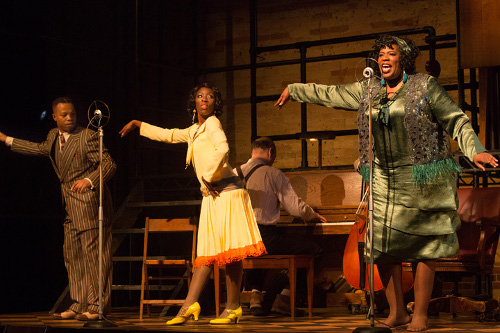 August Wilson’s masterwork play hits all the right notes, now on stage in Toronto
August Wilson’s masterwork play hits all the right notes, now on stage in Toronto
When you walk into the theatre for Soulpepper‘s adaptation of August Wilson’s Ma Rainey’s Black Bottom, you’re walking into a 1920s recording studio. This is apparent immediately, from the well-loved piano and old-fashioned microphones littering the stage, lying in wait to be used. While the space itself is relatively unassuming, the drama that takes place within is an elegant, well-acted, intricately crafted show that’s both entertaining and cerebral.
Ma Rainey’s Black Bottom is the third in Wilson’s Pittsburgh Cycle, a collection of ten plays that trace the Black experience in America through each decade of the 20th century, which also includes the Pulitzer-winning Fences. This play, which depicts an imagined recording session featuring early Blues singer Ma Rainey (played here by Alana Bridgewater), fills the ’20s slot in the series.
The plot itself largely revolves around the interpersonal relationships and character-driven conflicts between the members of Ma Rainey’s backup band. As they wait for Ma to arrive–late–to her recording session, they have nothing to do but play and talk. There’s Slow Drag (Neville Edwards), the bassist; Toledo, the well-read pianist (Beau Dixon); and Cutler ( Lindsay Owen Pierre), who plays trombone. Tensions arise mainly from the fiercely ambitious and hot-tempered Levee (Lovell Adams-Gray), the trumpet player with dreams of recording his own music with his own band.
One of Wilson’s particular gifts as a writer was for singing dialogue, and here the show absolutely hums. The language here is both poetical and slang-y, with nods to both the linguistic quirks of the Roaring ’20s and what Wilson described as “the poetry in the everyday language of Black America.” In a play like this, the words really are the star attraction. Mumbi Tindyebwa Otu’s elegant direction wisely keeps it intimate and stark throughout, giving Wilson’s script ample room to breathe.
Much of the heavier lifting here goes to Lovell Adams-Gray as Levee, a young man brimming with talent and ambition. Adams-Gray’s Levee is quick and complicated, charismatic and simmering with fierce desires and a hot temper. This gradually growing anger–fueled by the frustrations of being constantly reminded that he is, at best, a disposable commodity–is nuanced and complex, built carefully over several scenes of disappointed hopes and button-pushing conflicts. There’s a bubbling energy that seems poised and ready to burst out of him at any given moment, twisting from joy and enthusiasm to frustration and fury with powerful dexterity. Hats off to this heartbreaking, powerhouse performance that, at times, had me wanting to applaud.
Alana Bridgewater is also fantastic in the title role of Ma Rainey, who–when she finally does show up to record–is tough, uncompromising, and full of appealing grit. From minute one, it’s evident that Bridgewater’s Ma doesn’t care if you like her or not, but she’ll be damned if she doesn’t do things her way. To watch her insist on exerting her power, particularly over her white managers, is absolutely thrilling, and it’s impossible not to be drawn to her earthy, uncompromising performance.
With all of these characters colliding, what follows is a tightly paced, philosophically engaging exploration of Black life in the 1920s. Importantly, however, the play’s themes resonate beyond a mere historical record, as any good history play does. Conversations about identity, agency and artistry are inextricably tied up in the dialect, language and social reality of race, and the complexity of Wilson’s writing draws out all of these conversations and leaves them bare on the stage to follow you home after the final curtain has fallen.
Powerful performances and engaging, complex writing make Ma Rainey’s Black Bottom a show not to be missed. I left the show eager to get my hands on a copy of the script, ideally to be re-read while listening to some Ma Rainey recordings. Whether or not you’re a fan of the Mother of the Blues, I encourage you to go and see this piece of quality theatre currently firing on all cylinders down in the Distillery.
Details:
- Ma Rainey’s Black Bottom is on stage at the Young Centre for the Performing Arts (50 Tank House Lane in the Distillery District) until June 2nd, 2018.
- Performances run Mondays through Saturdays at 8 pm with select matinees at 2 pm. See website for details.
- Tickets start at $35, and can be purchased online, in person at the box office before the show, or by calling 416 866 8666.
- Performance runs 2 hours and 30 minutes, with one 20 minute intermission.
Photo of Marcel Stewart, Virgilia Griffith, Beau Dixon and Alana Bridgewater by Cylla von Tiedemann.

That’s Beau Dixon in the photo as well (playing piano)
We have seen plays about early blues musicians such as Billie Holiday and Alberta Hunter that were interesting and musically entertaining, We had high hopes for Ma Rainey being one of them. Alas, this was our biggest disappointment in a long time.
I was disappointed with the play. At the last row, we could not hear half that was said by the actors. Many actors simply did not project their voices, plus the addition of accent made it very hard to understand. That really prevented audiance from getting engaged by the dialog. It was not clear if the director aimed to have a social drama with commentary because some of the characters were 2-dimensional caricatures. That was a miss. I think that a lot had to do with directing which failed to define the depth of characters and guide actors about projecting their voice and setting their accents to be understood. What is the point of social drama if the audiance does not hear it? The advertising played up the music but the play had very little to do with music and much more with social commentary.